
"LIVE FREE OR DIE" is the motto of New Hampshire, one of the 13 original U.S. colonies. New Hampshire's 157th Air Refueling Wing (ARW) was chosen as the first Air National Guard (ANG) unit to field the new Boeing Pegasus. The KC-135R was a major success for the unit, and New Hampshire was instrumental in maintaining solid mission readiness rate performance. With the demise of the KC-10A and now with the stalwart Stratotanker entering the sunset years, the KC-46A has become a welcome addition to the U.S. inventory.
New Hampshire actually has two flying squadrons that fall under the 157th ARW umbrella, those being the 133rd ARS "Wildcats" and the 64th ARS "Phoenix." While the 133rd ARS is an ANG unit, the 64th is an active-duty associate unit: it stood back up in July of 2022 and will bring 159 new "embedded" members to Pease ANGB. The two squadrons are essentially melded and function as one squadron although the 64th ARS falls under the 22nd Air Refueling Wing at McConnell Air Force Base for their the administrative/financial structure.
As for the new kid on the block, are there "new aircraft" teething issues? Yes, but what new recent program is free of issues? And issues will be resolved as the program matures (such as the F-35, V-22, and so on).
Enhancements are being made and within a few years, the aircraft bugs should mostly be worked out. Rather than dwell on the bugs, let's explore what the KC-46A brings to the table.
With their full-complement of 12 Pegasus now in the stable, New Hampshire received its last KC-46A on February 5, 2021. The primary missions are aerial refueling, moving cargo, and transporting passengers. Eventually the aircraft will be able to support increased cargo and passenger loads, making it a great asset to globally deploy units along with parts, logistical needs, and travel to wherever is needed. The unit's aircraft can refuel enroute as well during the movement.
This story is from the {{IssueName}} edition of {{MagazineName}}.
Start your 7-day Magzter GOLD free trial to access thousands of curated premium stories, and 9,000+ magazines and newspapers.
Already a subscriber ? Sign In
This story is from the {{IssueName}} edition of {{MagazineName}}.
Start your 7-day Magzter GOLD free trial to access thousands of curated premium stories, and 9,000+ magazines and newspapers.
Already a subscriber? Sign In

Keeping 'em Flying!- The new generation of warbird pilots, restorers and mechanics
The new generation of warbird pilots, restorers and mechanics. Nearly 80 years after the end of World War II, the fighters, bombers, and trainers that defended freedom continue to enthrall and inspire audiences at airshows, thanks to generations of warbird pilots, maintainers, restoration specialists and collectors. In our September, 2022 issue we introduced you to the young warbird pilots, maintainers and restorers who are already beginning to displace more "experienced" warbird fliers and fixers.

The Corsair Maker- Bringing the Vought Corsair to the fleet was a daunting challenge that spanned nearly three years.
When the first production Corsairs exited the Stratford factory in June 1942, Guyton, as seen here, was tapped to manage the flight and production test program. Armament was improved to six wing-mounted .50s, displacing the wing fuel tanks now placed forward of the cockpit which necessarily was moved rearward by 32 inches. Overall length was increased, armor plate added, landing, arresting and tail gear improved, aileron control enhanced, and a new version of the R2800 engine was incorporated. But those significant improvements unearthed numerous idiosyncrasies that would take an extended period to make the Corsair acceptable for carrier operations
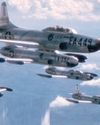
STARFIRES Over Korea
F-94 pilots tangle with MiGs
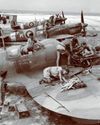
Training Mission
BY THE TIME THIS TRAINING SCENE WAS RECORDED in Canne, Italy, in July 1944, Allied Yugoslavian airmen had several years of experience working side by side with the RAF.
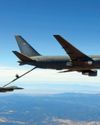
KC-46A PEGASUS
Next generation aerial refueler
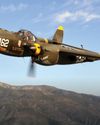
"SATAN'S ANGELS" ACE - Tales from a P-38 pilot in the South Pacific
\"AS A KID GROWING UP on the bow of my father's tugboat, hauling oil from Seattle to Alaska, I had a lot of time on my hands.
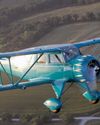
WACO YKC - Stunning and Ultra Rare Golden Age Cabin Flier
BETWEEN THE IMPLEMENTATION of the Air Commerce Act of 1926 and December 31, 1948, all U.S. registered flying machines sported an N-number, much as they do today, the \"N\" being an internationally recognized identifier for the United States. During that period, however, an additional letter-identifier followed the \"N.\" Depending on their category, they were registered in the NC (Commercial), NG (Glider), NL (Limited), NR (Restricted, usually meaning race airplanes), NS (State government), and, finally, NX (experimental).
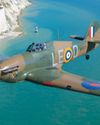
BADER'S HURRICANES
Double amputee fighter ace Douglas Bader and his Battle of Britain Hurricanes
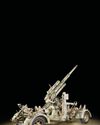
Scourge of the Allied Fighters
IT HAD TO BE THE MOST HELPLESS FEELING in the world: you're at 25,000 feet over Europe knowing that your primary function is to drop bombs-or flying escort for the bombers while being a slow-moving target for some of the world's finest shooters. However, you have John Browning's marvelous .50 caliber invention to give some degree of protection. Unfortunately, you're absolutely helpless against flak. Piloting and gunnery skills play no role in a game where sheer chance makes life and death decisions. For that reason, the Krupp 88 mm Flak 18/36/37 AA cannon could be considered WW II's ultimate stealth fighter. You never saw it coming.
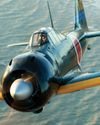
ZERO MYTH, MYSTERY, AND FACT
A test pilot compares the A6M5 Zero to U.S. fighters